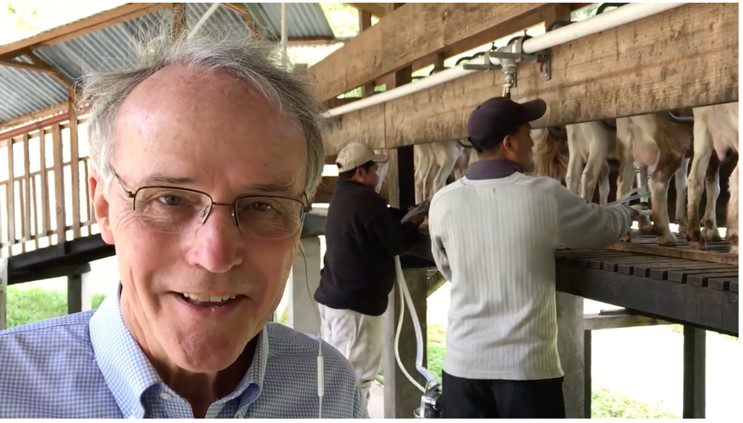In late 2018, Rev. David Beckmann, president of Bread for the World, traveled to Ethiopia and Guatemala to see how development programs are improving access to nutrition, decreasing hunger, and bolstering resilience in communities. Along the way, he recorded short videos so that he could share his experience with Bread members. Click the links below to view a video and travel along with David to see how smart development is taking a bite out of hunger.
An experience of God moving in our time
(click here to view video)
“This is God,” says Rev. David Beckmann about Ethiopia’s reductions in child mortality. Global progress against hunger, poverty, and disease is an experience of God moving in our time. Two-fifths of the children in Ethiopia are still malnourished, but the Ethiopian government and international organizations are delivering effective nutrition assistance in many communities. The world’s gradual progress against hunger has suffered a reversal over the last several years, but not in Ethiopia. Learn more about how the U.S. government is helping to reduce nutrition and how to make that effort more effective by reading A Multi-Sectoral Approach to Nutrition. Assessing USAID’s Progress.
Ethiopia: A story of resilience
(click here to view video)
The Tigray region of Ethiopia has been repeatedly struck by famine. But David saw how U.S. food aid has financed reforestation projects that have increased rainfall, raised the water table, and helped to reduce the likelihood of famine. Agricultural assistance to Tigray’s farmers and improvements in the international humanitarian system have also reduced the risk of famine. Learn more about climate-resilient solutions in the 2017 Hunger Report: Fragile Environments, Resilient Communities.
Trade and poverty reduction in Ethiopia
(click here to view video)
David visits Hawassa Industrial Park in southern Ethiopia and sees how U.S. trade policy can spur economic growth and reduce poverty. The African Growth and Opportunity Act (AGOA)— legislation that Bread for the World has supported since 2000—improves the access of qualifying African countries to export into the U.S. market. Trade policies can benefit Americans and also help create jobs in Africa. Ethiopia has improved education, health, and agriculture, but its growing youth population has made job creation and manufacturing high priorities. Learn more about the jobs challenge in our country and developing countries in the 2018 Hunger Report.
Advocacy works
(click here to view video)
David reflects on progress he has seen in Ethiopia as his visit there winds up. He thanks Bread members for our role in advocating for U.S. programs and policies that have helped to reduce hunger in Ethiopia. Poverty-focused development assistance – notably agriculture, nutrition, and reforms in food aid – together with the smart trade policy in the African Growth and Opportunity Act are giving many families in Ethiopia a hand up. Poverty-focused development assistance, which is less than 1 percent of the federal budget, is lifting millions of people out of poverty.
Improving child nutrition in the Guatemalan Highlands
(click here to view video)
On the same trip, David traveled to Guatemala. In both Ethiopia and Guatemala, he saw nutrition programs at work. In this video, he visits an NGO that is distributing an improved variety of goats. If the goats a family raises produce more milk, their children are better nourished. Good nutrition during the 1,000-day period from the beginning of a woman’s pregnancy to her child’s second birthday is critical to a child’s health and future well-being. Bread for the World’s 2019 Offering of Letters: Better Nutrition, Better Tomorrow urges our government to accelerate progress toward ending hunger by increasing funding for global child nutrition programs.
Guatemala and trade: A sweet story
(click here to view video)
David visited Puerto Quetzal, Guatemala’s largest Pacific Ocean port. Trade and economic growth can help end hunger, and the Guatemalan sugar industry has taken steps to address environmental issues and community concerns around the sugar plantations. Learn more about how global interdependence can be managed in ways to reduce hunger in the United States and worldwide in the 2018 Hunger Report: The Jobs Challenge.
Conflict as a root cause of hunger
(click here to view video)
David is moved by his visit to a cemetery near the village of La Esperanza. The long-ignored grievances of Mayan and other indigenous people led to a long civil war in Guatemala (1960-1996). Two hundred thousand people died and hundreds of thousands more fled across the border to Mexico. Social justice and peace are basic to progress against hunger. To learn more about the connections between conflict and hunger—made worse by climate change—read the 2017 Hunger Report: Fragile Environments, Resilient Communities.
Racial injustice and the power of faith
(click here to view video)
Long-standing discrimination continues to limit opportunities for indigenous people in Guatemala today. David asked Fidel Xinico Tum, his main guide in Guatemala, to explain how Mayan people have been able to achieve considerable economic and social progress nevertheless. Fidel, himself Mayan, thanks “the heart of heaven/heart of the earth” for giving Mayan people the strength to continue and flourish. Learn more about discrimination and hunger in the 2015 Hunger Report: When Women Flourish, We Can End Hunger.
Foreign assistance and Guatemala
(click here to view video)
In his final video, David notes ways that the advocacy of Bread for the World members has clearly helped in Guatemala. Poverty-focused development assistance, including nutrition assistance, has had a positive impact. Bread’s current work on immigration policy is also relevant. Assistance can reduce the poverty and violence that are driving most of the immigration to the United States’ southern border. Learn more about push factors in “Fact sheet: Why are families leaving Central America?“
The 2019 Offering of Letters: Better Nutrition, Better Tomorrow
(click here to view video)
David visits a nutrition program in Ethiopia and is filled with hope. Today, millions of children are thriving around the world because of global nutrition programs—programs and funding that exist because of your past advocacy. This year’s Offering of Letters campaign urges our government to accelerate progress toward ending hunger by increasing funding for global child nutrition programs. Do something really good. Go here to find out how you can make a difference.



